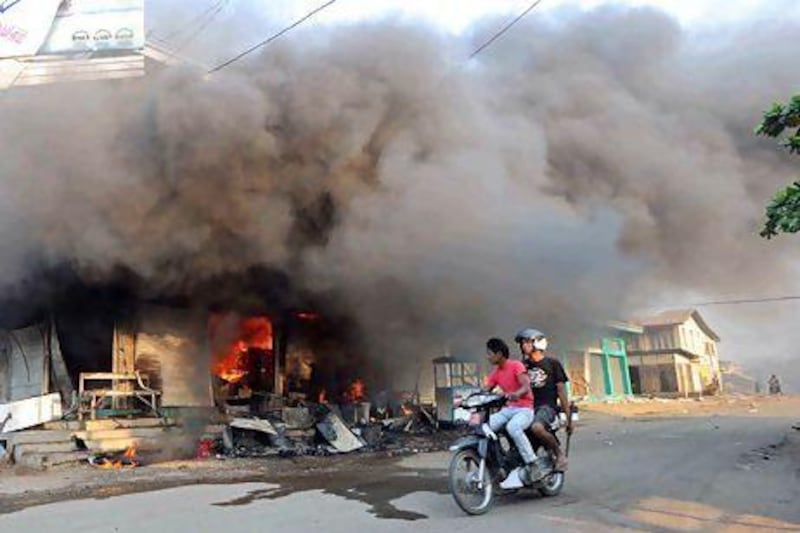BANGKOK // Myanmar's president declared a state of emergency in Meikhtila today after more than 30 people were killed in anti-Muslim riots.
Several mosques have been destroyed and hundreds forced to flee their homes since the riots broke out on Wednesday in the central Myanmar town.
Abu Tahay, a Muslim politician with a network of sources in the town, said 36 people had been killed and 10 mosques destroyed, while dozens of Muslim homes and shops were razed.
His numbers could not be independently verified, but footage from local journalists showed large mobs walking through a devastated landscape of burning buildings and rubble yesterday.
The office of president Thein Sein said the state of emergency would enable the military to help restore order.
Images of bodies amid the wreckage spread across the internet, and there were reports that anti-Muslim attacks were also taking place in nearby villages.
The attacks are thought to have started after a row in a Muslim-owned gold shop on Wednesday. A mob of Buddhists trashed four gold shops in the neighbourhood, sparking clashes between the two communities. Violence escalated rapidly after a Buddhist monk was killed that afternoon.
By nightfall, hundreds of locals, in some areas led by Buddhist monks, were rampaging through Muslim neighbourhoods.
"The simple explanation is that this started with a quarrel in a shop, but we believe it was pre-planned and organised violence against Muslim people," said Mr Tahay, who is based in Yangon and campaigns for Muslim rights. "All this happened in front of security forces and army personnel, who did nothing."
This was confirmed by a member of the 88 Generation political activist group, which has sent members to the town. One told Mizzima news group: "Security forces were beefed up in the town, but they just stood watching the rioters, and did not take any action."
Most of the violence against Muslims in Myanmar has focused on the Rohingya community in the south-western state of Rakhine. Two waves of communal rioting hit that region in June and October last year, killing at least 180 people and displacing more than 110,000, mostly Rohingya.
The Rohingya are considered one of the most persecuted minorities in the world. Denied citizenship in Myanmar, many locals see them as illegal immigrants and they face severe restrictions on movement, marriage and employment.
But recent attacks suggest the problem is no longer centred on immigration, with violence now threatening all Muslims in the country, including those with full citizenship.
Last month, attacks occurred in the country's largest city, Yangon, for the first time in years. A mob of about 300 Buddhists destroyed a Muslim school in Thaketa suburb following claims that it was being turned into a mosque. Two weeks later, dozens of Muslim-owned shops were attacked in another suburb, Hlaing Tha Ya.
"A group of 300 people came to our shop. They had knives and sticks and they broke everything we had. We were very afraid. Then they moved on to the next Muslim shop across the road," said one shopkeeper at the time. He did not give his name for fear of reprisals.
"They shouted at us: 'This is our land. We don't want any kalar [a racial slur referring to darker-skinned South Asians] in our country."
Chris Lewa, director of Arakan Project, a human-rights NGO, said there had always been a risk the violence could spread outside of Rakhine state.
"The Rohingya issue has been largely an ethnic conflict - they are targeted because they are considered illegal intruders," she said. "But from the start, it also had a strong religious element.
"The military regime cultivated a very strong nationalism in the Burmese that is tied to religion. Since the reforms, many are worried about a flood of illegal immigrants, and local leaders have more freedom to instigate and provoke violence."
Despite recently promising to "pursue the norms of human rights and humanitarian efforts", reformist President Thein Sein has done little to address the mounting religious tensions in his country.
Activists have been even more disappointed with opposition leader, Aung San Suu Kyi, who has been largely silent on the plight of Muslim minorities in Myanmar, apparently fearing the reaction of Burmese voters.
She reportedly contacted police in Meikhtila shortly after the riots started this week, and told them to "take serious action", although she has so far refrained from public comment.
foreign.desk@thenational.ae






